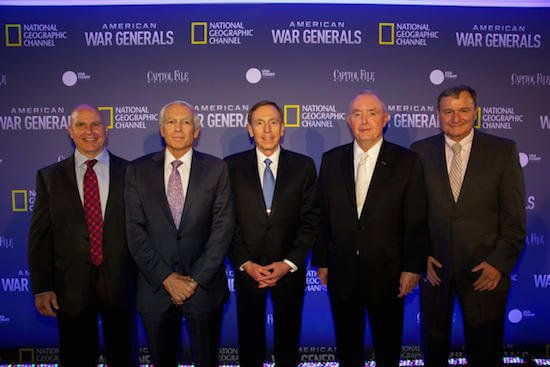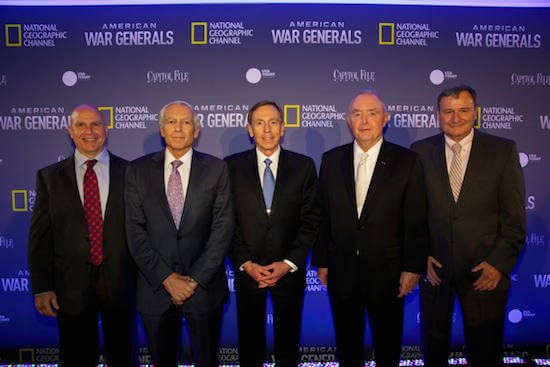
Lt. Gen. Herbert R. McMaster, Gen. Wesley Clark (Ret.), Gen. David Petraeus (Ret.), Gen. Barry McCaffrey (Ret.), Lt. Gen. Karl Eikenberry (Ret.)
National Geographic Channel held the world premiere for "American War Generals" September 8th, 2014 at the Mellon Auditorium in DC. General David Petraeus (Ret.), Lt. Gen. Karl Eikenberry (Ret.), Lt. Gen. Herbert R. McMaster, Gen. Barry McCaffrey (Ret.), and Gen. Wesley Clark (Ret.) attending the screening. âAmerican War Generalsâ premieres Sunday, September 14 at 8PM ET/PT.
(Photo Credit: National Geographic Channels/Evelyn Hockstein)
By Richard Sisk
The memory banks of generals tend to be cluttered no-go areas where laundry lists of shoulda’, coulda’, woulda’ second guesses are piled on top of the “if onlys.”
As in, if only this or that President, or Defense Secretary, or rear echelon dimwit had listened to me, well then, sweet victory would have been mine.
There’s a lot of that going in National Geographic’s compelling, if Army-centric, two-hour documentary American War Generals, billed as “a first-of-its-kind look back at a half century of America’s military battles told by the men that led them.”
%embed1%
The film, produced by Tresha Mabile and Peter Bergen, will premiere this Sunday, Sept. 14, at 8 p.m. on the National Geographic Channel in the U.S. and later this year in 171 countries.
Some of the score-settling indulged in by the 11 retired and active Army generals who were interviewed is nothing short of delicious.
Here’s the syntax-challenged Gen. Barry McCaffrey on former Defense Secretary Donald Rumsfeld and Iraq:
“I think taking down Saddam (Hussein) was the right thing to do. Screwing up the military operation was not. So I have a permanent sense of hatred for what Secretary Rumsfeld and these people that got in there and convinced themselves that they could do this with a minimalist approach of military power.”
The producers also caught the generals engaging in self-doubt, even if being a general means never having to say you don’t know what you’re doing. The viewer can come away with a now-they-tell-us sense of frustration.
Here’s Gen. Stanley McChrystal on Iraq in 2005: “It’s funny, the U.S. military and U.S. politicians never talked about losing, but we absolutely knew we could lose. And in the summer of 2005, that was starkly apparent to me and the people I served with.”
And here’s Gen. David Petraeus on taking command in Iraq in 2007 and implementing his vaunted surge: “I remember putting my head on my desk and wondering really, you know, why did I ever take this one on.”
The film takes a pass on Petraeus’ downfall over an extra-marital affair. The audience at the preview for the film also gave Petraeus a pass. When five of the generals interviewed in the film were introduced, Petraeus drew the most applause.
Cramming 50 years of military history from Vietnam through 9/11 and Iraq and Afghanistan into a two-hour documentary was a monumental task for the producers and inevitably led to a scatter-shot approach.
The views of the generals from Colin Powell through currently serving Gens. Ray Odierno and H.R. McMaster can be summed up this way: Vietnam sucked and left the Army a mess. The all-volunteer force and the military buildup in the ‘80s restored the Army and won the Cold War and the first Gulf war. As for Iraq and Afghanistan, well, mistakes were made and the verdict is still out.
After Vietnam, “we looked in the mirror and saw what we had become,” Powell said.
The commanders-in chief, from Lyndon Johnson through Barack Obama, tend to fare badly, with the exceptions of Ronald Reagan and George H.W. Bush.
As McMaster put it, ‘there’s two ways to fight the United States – asymmetrically and stupid.” Luckily for George H.W. Bush, Saddam chose from Column B in the first Gulf war.
The film employed the familiar footage of former President George W. Bush landing on the carrier deck a month after the Iraq invasion. There he is again under the “Mission Accomplished” banner, declaring that “In the battle of Iraq, the U.S. and its allies have prevailed.”
In the context of what the generals are saying, the scene has never looked more pathetic. “In the beginning of the war in Iraq, we were in denial,” Petraeus said.
If one figure can be said to dominate the film, it is McChrystal. His intensity pours from the screen and he still seems to be hurting over Obama’s decision to get rid of him as Afghanistan commander.
The White House was furious over leaks that McChrystal was asking for 40,000 additional troops in Afghanistan. McChrystal claimed that the leaking wasn’t coming from him. Then there was the “Runaway General” article in Rolling Stone in which McChrystal’s aides dissed Obama by proxy.
McChrystal was quickly yanked back to Washington. He said he knew what was going to happen when he went to see Obama in the Oval Office. “He said he was going to accept my resignation and that was it. I had no doubt what the President’s decision was going to be,” McChrystal said.
The film closes with McChrystal in the tourist’s uniform of shorts and sandals wandering the battlefield at Gettysburg, looking for meaning in the sacrifice of thousands, and maybe for himself.
McChrystal gazes at the many monuments to leaders and regiments and volunteers. The monuments were not just chest-thumping tributes to those who fought the battle, McChrystal said.
“They wanted some validation that what they’d done mattered,” McChrystal said. “You need some affirmation.”




